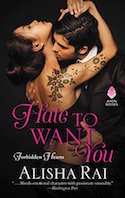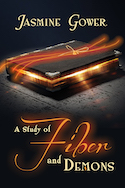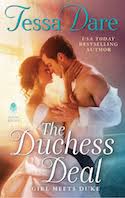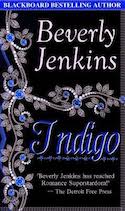Kissing Books: the sunrise of your enemy
New column! Every month, Olivia Waite pulls back the covers, revealing the very best in new and classic romance. We’re extending a hand to you. Won’t you take it?
This month’s books show that in Romancelandia, enemies and villains are not precisely the same thing.
An enemy is a useful cog in any genre’s story machine. Opposing goals spark conflict, lead to arguments and struggles, and the straightforward kind of who’s gonna win this drama that so many books and movies and reality shows thrive on. Romance has featured volatile enemies ever since Beatrice and Benedick first traded insults, or since Elizabeth Bennet first told Mr. Darcy he could take his proposal and shove it somewhere thoroughly ungenteel (I paraphrase).
Darcy and Benedick, though, are not our story villains. That role goes to Don John (I love the blank and bitter Keanu Reeves portrayal. Fight me) and Wickham, that charm-vomiting lech. Villains are also useful to the plot – but villains are static, unpleasant, morally repulsive. Unredeemable.
Enemies, though, can be turned into lovers.
There’s a whole romance subgenre for this, called, with laudable clarity, enemies-to-lovers. In other words there is a whole species of book that exists to turn someone you hate into someone you love. Outsider views of mainstream romance often imagine both hero and heroine as idealized archetypes – the too-oft-expressed fear that frumpy housewives will catch Unrealistic Expectations from all those fuschia Fabio hunks assumes that romance heroes are always kind, protective, and sexually generous. On the page, though, romance heroes/heroines are frequently assholes. They scorn. They undermine. They loathe with the fire of a thousand suns.
And then…they learn. They change. They begin to defend each other, in private first and then in public. An enemy might make a mistake, or follow a bad principle, or operate under a misunderstanding – but they will repent this, and eventually find some way to atone. Love and respect blossom in the unlikeliest of places. When done well it feels like a sunrise breaking over the horizon of the heart.
So here’s to the enemies, the nemeses, the soon-to-be-cherished foes. They show us that hatred can be set aside. That opposition and conflict are not the same thing as evil.
They give us hope for one another. It’s what romance does best.
Recent romances

Sidebar by Carsen Taite (Bold Strokes Books: contemporary f/f.)
There was so much to like about this book. Judge Camille Avery is new to the federal bench and looking to make an impression. Her new clerk West Fallon would rather be saving the world but couldn’t break a promise to her mentor to serve the court system for one year. The heroines sparkle both alone and when together – which makes it a complete mystery why the book spends so much time keeping them separated. They honestly spent more time avoiding each other than they did falling in love, which makes the big Grand Gesture at the end ring terribly hollow. That said, this is a stellar example of what romance readers call competence porn, where part of the pleasure is watching the protagonists actually perform their fancy, exciting, difficult jobs.
Other girls dreamed of being president someday, but in her dreams she’d been wearing a black robe and seated beside eight other justices at the highest court in the land. This was just the first step, and she was determined to tread carefully.

Hate to Want You by Alisha Rai (Avon Books: contemporary m/f)
Every so often an already strong author pulls out the stops and presents the world with a masterpiece. Jeannie Lin’s The Jade Temptress, for instance, or Earth Bound by Emma Barry and Genevieve Turner. And now Alisha Rai, because this is hands-down the best romance I’ve read all year. Sharp, sexy, funny, and achingly real, it’s the first in a trilogy of romances between two once-close, now-feuding families, the Kanes and the Chandlers, where the weight of secrets is almost Gothic. Everybody has something to hide; everybody has something to lose. Nicholas Chandler is an executive for the grocery chain his family used to co-own with the Kanes – before a fatal crash, a shady business deal, and a suspicious fire shattered the relationship. Nico is a dutiful son, a loving grandson, and a protective older brother 364 days out of the year. That last day belongs to Olivia Kane, his high school love whom he’s never gotten over. Now a successful tattoo artist moving from city to city, Livvy texts him one day a year for the furtive, desperate sex they can’t seem to stop having. But now Livvy’s back to care for her ailing mother, and with a town full of gossips watching, she and Nico will have to try to keep their distance and keep the walls up between their wounded hearts. You can guess how well that works. It’s glorious.
“You’re so damn stubborn, Livs.” “A stubborn marshmallow?” “All marshmallows are stubborn. Nothing that soft could hold its shape unless it was stubborn as hell.”

A Study of Fiber and Demons by Jasmine Gower (Less Than Three Press: fantasy m/m/f)
Academic infighting at a magical university: my absolute favorite thing in any genre. Fantasy romance often has more scope for moral flexibility, less shiningly heroic heroes, and this book takes full advantage of that liberty. Disgraced academic Alim is petty and bitter and more than a little shady – he’s also intelligent and ambitious and lonely, which together nicely temper his obvious faults. The romance is slow to start, but who cares when the bickering is so much fun? This is definitely one of the least optimistic romances I’ve read in some time – people are treacherous and self-serving, academia is corrupt at every level – but watching three uniquely terrible people come to care for each other and decide to be slightly less terrible is surprisingly satisfying. Plus squid-demons and an underwater city. It breaks my heart a little that the title and cover are not more representative of this book’s wit and charm.
“Now don’t be like that,” Alim said, but he didn’t push Liam’s hand away. “You’re my nemesis. What would people say?”

The Duchess Deal by Tessa Dare (historical m/f, Avon Books)
A Regency romp is like a glass of champagne: all sparkle and fizz. You can’t live on it, but the best ones make you wish that you could. This book strings a series of implausible events together with snappy dialogue and dazzling chemistry. There are anachronisms, but to trot them out for pedantry’s sake would be like criticizing the Marx Brothers for unrealistic set design. This is a Technicolor romance version of Beauty and the Beast and Cinderella smashed together, with a dash of Batman thrown in for shits and giggles. And there are giggles, thanks to Dare’s genius for delightful turns of phrase. The wit makes familiar character types seem new again: the misanthropic, wealthy ducal hero with a scarred face, the open-hearted seamstress heroine with a spine of steel, snarky butlers, plucky urchins. A feel-good, laugh-out-loud confection for when you’re harried and heartsore.
“Do not harbor any illusions that my scars transformed me into a jaded, ill-tempered wretch. I was always – and shall remain – a jaded, ill-tempered wretch.” “Were you always this long-winded, too?”
This Month’s Romance Believes Black Lives Have Always Mattered

Indigo by Beverly Jenkins
To read a Beverly Jenkins historical is to see the veil drawn aside and a light shone down onto the past. The celebrated Queen of black American historical romance, she focuses on black heroes and heroines – most in the 19th century, though she also writes contemporaries – who are the architects of their destiny and staunch advocates for their race. Indigo is the story of Hester, a formerly enslaved heroine, and Galen, a wealthy black Creole hero, born free: both work for the Underground Railroad and fight against the shuddering cruelties of the chattel slavery system in 1856 Michigan. It’s common to say that historical romance’s appeal lies in its escapism – but it’s important to ask just who is escaping, and from what. Fantasies of vast aristocratic wealth and social power can exclude readers when those fantasies depend on the subjugation of entire groups of people, as shown in Tyrese L. Colman’s great recent essay on reading Jane Eyre while black. Beverly Jenkins is focused on a whole other kind of escape, both literally and figuratively. She offers readers visions of black community and shared purpose during a time when whitewashed historical narratives would have us believe all black folk lived in bondage, poverty, and fear. She gives respect, tenderness, and love to people who were too often met with violence, derision, and dehumanization. Her stories ring with rich details – Indigo is based on the true story of a free black man who sold himself back into slavery to be with the woman he loved; the book features a cameo by John Brown and shows characters supporting the Free Produce Movement. The question of whether slavery will end by law or by bloodshed looms large. All this plus heart-stopping adventure, swoony sex, and intrigue. Some classics grow rickety with the passage of time: this one only feels more and more vital as the weird time of 2017 weirds on.
Upcoming Conventions and Conferences
The second ever Historical Romance Retreat has a stellar lineup: Julia Quinn, Eloisa James, Elizabeth Essex, Jade Lee, and Delilah Marvelle, among others. Spokane’s Davenport Hotel is a uniquely charming venue and a perfect backdrop for expert historical garb – you’ve never seen anything quite like a ballroom full of historical romance fans dressed to the nines. In addition to author meet-and-greets and some truly tempting presentations (History of Medicinal Herbs! The Women of Pugilism! A tasting lecture on the history of port!), the schedule features a movie night, a Regency gambling night, a book fair, the Grand Ball, and an intriguing little calendar item called Absinthe and Abigails. The whole luxurious thing takes place September 27 - October 1.
Further out on the calendar
- The Emerald City Writers’ Conference: October 13 - 15
- Put Your Heart in a Book Conference: October 13 - 15
- Read With Pride Northwest: November 4 - 5
- JaneFest 2017: November 4